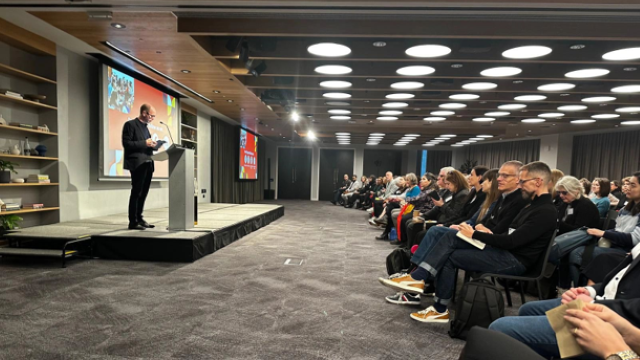-
QUALIFICATIONS
- For Linguists Worldwide
- For UK Public Services
- Preparation
- Policies & Regulation
-
MEMBERSHIP
- Join CIOL
- Membership grades
- NEW for Language Lovers
- Chartered Linguist
- Already a member?
- Professional conduct
- Business & Corporate Partners
-
ASSESSMENTS
- For Second Language Speakers
- English as a Second Language
-
EVENTS & TRAINING
- CPD, Webinars & Training
- CIOL Conference Season 2025
- Events & Networks
- CIOL Mentoring
-
NEWS & VOICES
- News & Voices
- CIOL eNews
- CIOL Awards
- The Linguist
- Jobs & Ads
-
RESOURCES
- For Translators & Interpreters
- For Universities & Students
- Standards & Norms
- CIOL & AI
- All Party Parliamentary Group
- In the UK
- UK Public Services
- Find-a-Linguist
In the experience of 'Learn French With Alexa', is English just badly pronounced French?
By Alexa Polidoro

Why should learners be interested in linguistics and the history and evolution of languages?
March this year saw the release of a book entitled La langue anglaise n’existe pas. C’est du français mal prononcé.
Perhaps unsurprisingly, an English version hasn’t (yet) been written, so I’ll translate that for you: The English language doesn’t exist. It’s just badly pronounced French.
The publication of the book made headlines, and not just in the French-speaking world. From The Daily Telegraph to The Hindu, the caustic proclamation by linguist Bernard Cerquiglini, who last year acted as advisor to President Macron on the development of the Cité internationale de la langue française, prompted reflections on the sometimes tense relationship between French and English.
As a teacher of French, I always like to stress the similarities between both languages. To prospective learners, the idea of learning French becomes a lot less daunting when you realise that around 30% of English words are French in origin, and that the 30% that are Latin in origin are also used in French.
But just because both languages are similar, that doesn’t quite make them the same. English is not a dialect of French, in the way that, for example, Hawaiian Pidgin is a dialect of English. In the latter example, both languages are mutually intelligible, at least to an extent. But even English speakers with an advanced knowledge of French can struggle to understand a native when they speak.
In fact, the Romance languages – Spanish, Italian, Romanian and so on – are much closer to French than English is, while the closest language to English is probably Frisian, a language spoken by half a million people in the Netherlands. English speakers often find it humorous when Frisian, or Dutch more generally, is spoken; the languages are so similar that it sounds uncanny, and to English speakers these languages can sound like English spoken in a strange accent. With the exception of M. Cerquiglini, perhaps, few people would think English sounds like French in a strange accent – or vice versa.
But all this is to take the author of La langue anglaise n’existe pas too literally, which is what a lot of online commentators seem to have done. The title of the book is less the precise, infallible statement you might expect from an academic, and more a wry reflection on the development of English, its purpose being chiefly to generate media attention. It certainly succeeded. And while Cerquiglini may have been exaggerating, he had a point. The English we use today is saturated with Frenchisms, especially when it comes to the terminology we use for the arts, commerce, government and the law. ‘If English is a prestigious, international language today,’ he writes, ‘it is thanks to French.’
But French also remains one of the most important languages you can learn. At Learn French with Alexa, we’re seeing more and more people wanting to learn the language of Molière, whether it’s for business, tourism, to consume Francophone culture in the original language, or simply for the fun of it. With the number of French speakers set to reach 650 million by 2050, the trajectory is pretty clear.
By that point, the differences between French and English may be even more acute, despite the borrowings between both languages. In French and English different approaches to inclusive language are being taken, from the pronouns we use to the gender of certain adjectives, while the organic development of slang in each language remains worlds apart.
For now, however, the gap between French and English is easily bridgeable, and to anyone hesitating to take the step into learning the former, I would say give it a go – it’s easier than you think! From their vocabulary to their developmental history, our languages have so much in common. Indeed, perhaps the only thing that's difficult to reconcile is our rather different sense of humour, which might be why the message behind Cerquiglini’s new book, which is ‘written from a humorous perspective’ and ‘deliberately in bad faith’, seems to have got lost in translation.
Views expressed on CIOL Voices are those of the writer and may not represent those of the wider membership or CIOL.
Filter by category
More
The Chartered Institute of Linguists (CIOL), Incorporated by Royal Charter, Registered in England and Wales Number RC 000808 and the IoL Educational Trust (IoLET), trading as CIOL Qualifications, Company limited by Guarantee, Registered in England and Wales Number 04297497 and Registered Charity Number 1090263. CIOL is a not-for-profit organisation.








